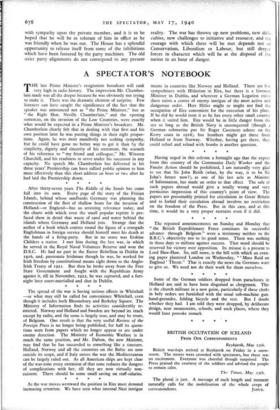After thirty-seven years The Riddle of the Sands has come
full into its own. Every page of the story of the Frisian Islands, behind whose sandbanks Germany was planning the construction of the fleet of shallow boats for the invasion of Holland—or England—has an arresting relevance today, and the charts with which even the small popular reprint is pre- faced show in detail that waste of sand and water behind the islands where Germany and Holland join. Strange that the author of a book which centres round the figure of a renegade Englishman in foreign service should himself meet his death at the hands of a firing-party. But in no sense was Erskine Childers a traitor. I met him during the last war, in which he served in the Royal Naval Volunteer Reserve and won the D.S.C. He had no part in the Easter Rebellion in Dublin in 1916, and, passionate Irishman though he was, he worked for Irish freedom by constitutional means right down to the Anglo- Irish Treaty of 1921. But then he broke away from the Free State Government and fought with the Republican Army against it, till in November, 1922, he was captured, and a fort- night later court-martialled and shot in Dublin.
• * *


































 Previous page
Previous page